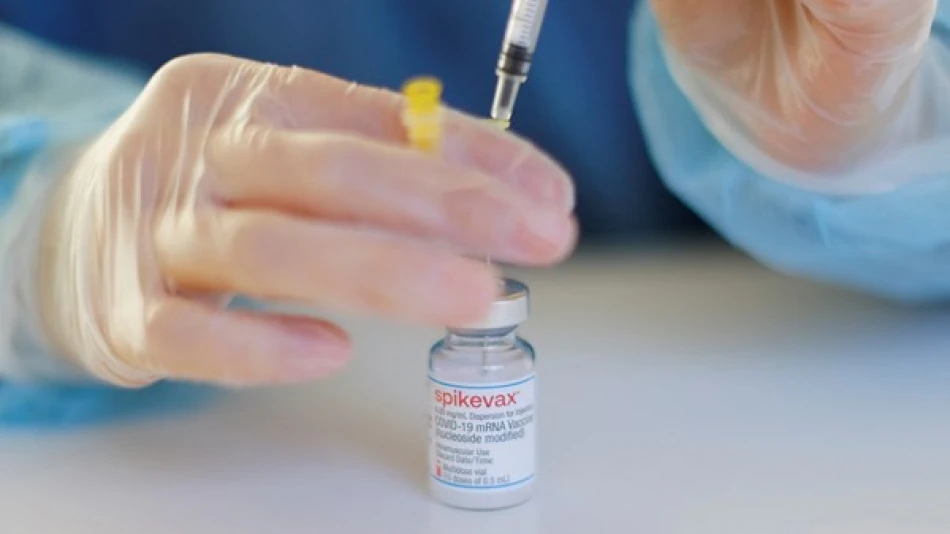
The Court Dismisses Pfizer's Appeal on COVID-19 Vaccines
British Court Victory Hands Moderna Strategic Advantage in Global mRNA Patent War
A British appeals court has delivered a significant win to Moderna in its high-stakes patent battle with Pfizer-BioNTech over core mRNA vaccine technology, upholding one crucial patent while invalidating another. The ruling positions Moderna to claim substantial financial damages and sets a precedent that could influence similar cases across multiple jurisdictions, potentially reshaping the competitive landscape for future mRNA-based therapeutics worth billions in revenue.
Court Upholds Key Patent Despite Pfizer Challenge
The UK Court of Appeal on Friday rejected Pfizer-BioNTech's challenge to a July 2024 lower court decision that validated Moderna's EP949 patent while invalidating the EP565 patent. The appeals court's refusal to overturn the original ruling means Moderna retains exclusive rights to critical mRNA formulation technology that underpinned COVID-19 vaccine development.
This mixed outcome reflects the complex nature of biotechnology patents, where incremental innovations can carry enormous commercial value. The EP949 patent covers lipid nanoparticle formulations essential for delivering mRNA into human cells—a breakthrough that made both companies' vaccines possible during the pandemic.
Global Implications Beyond British Borders
The British ruling carries weight far beyond UK jurisdiction. Similar patent disputes between these pharmaceutical giants remain active in the United States and Germany, where courts often look to peer jurisdictions for guidance on complex technical matters. A favorable outcome in Britain strengthens Moderna's negotiating position and legal arguments in these parallel cases.
For investors, this decision validates Moderna's intellectual property strategy and suggests the company's patent portfolio may be more defensible than previously assumed. The ruling also highlights how pandemic-era innovations continue generating legal and financial consequences years after their initial deployment.
Financial Stakes and Market Dynamics
The validated EP949 patent opens the door for Moderna to seek substantial financial damages from Pfizer-BioNTech's COVID vaccine sales, which generated over $100 billion in combined revenue during the pandemic's peak years. Even a small royalty percentage could translate to billions in compensation.
This patent victory also strengthens Moderna's competitive position in the broader mRNA therapeutics market, which analysts project could reach $50 billion annually by 2030. Control over fundamental delivery mechanisms gives Moderna leverage in licensing negotiations and partnership deals across oncology, rare diseases, and future pandemic preparedness.
Technology at the Heart of the Dispute
The legal battle centers on messenger RNA (mRNA) technology that revolutionized vaccine development during COVID-19. Unlike traditional vaccines that use weakened viruses or proteins, mRNA vaccines instruct human cells to produce specific proteins that trigger immune responses.
Both Moderna and Pfizer-BioNTech built their pandemic success on this platform, but the underlying patents reveal years of prior research and development. Moderna argues its innovations in lipid nanoparticle formulations were essential to making mRNA vaccines stable and effective, while Pfizer-BioNTech contends these patents lack sufficient novelty to warrant protection.
Industry Precedent and Future Battles
This ruling establishes important precedent for biotechnology patent enforcement in an era of rapid innovation. Unlike software or mechanical patents, biotech intellectual property often involves subtle molecular modifications that can be difficult to differentiate but carry enormous therapeutic significance.
The decision also signals that courts are willing to uphold legitimate biotechnology patents even when challenged by industry giants. This could encourage continued R&D investment in mRNA platforms while warning companies against assuming competitor patents are automatically vulnerable to challenge.
Pfizer has indicated it will pursue further appeals, suggesting this legal battle may continue for months or years. However, each unsuccessful challenge strengthens Moderna's patent position and increases potential damage awards, creating mounting pressure for settlement negotiations.
As mRNA technology expands beyond COVID vaccines into cancer treatment, heart disease, and other therapeutic areas, control over foundational patents becomes increasingly valuable. Friday's ruling positions Moderna as a stronger player in this next phase of biotechnology competition.
Most Viewed News

 Layla Al Mansoori
Layla Al Mansoori






